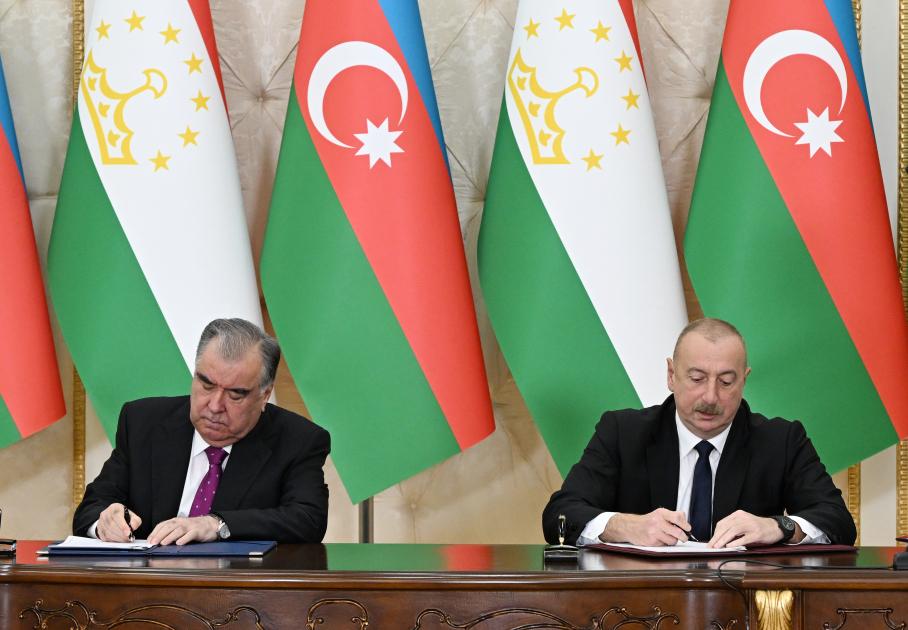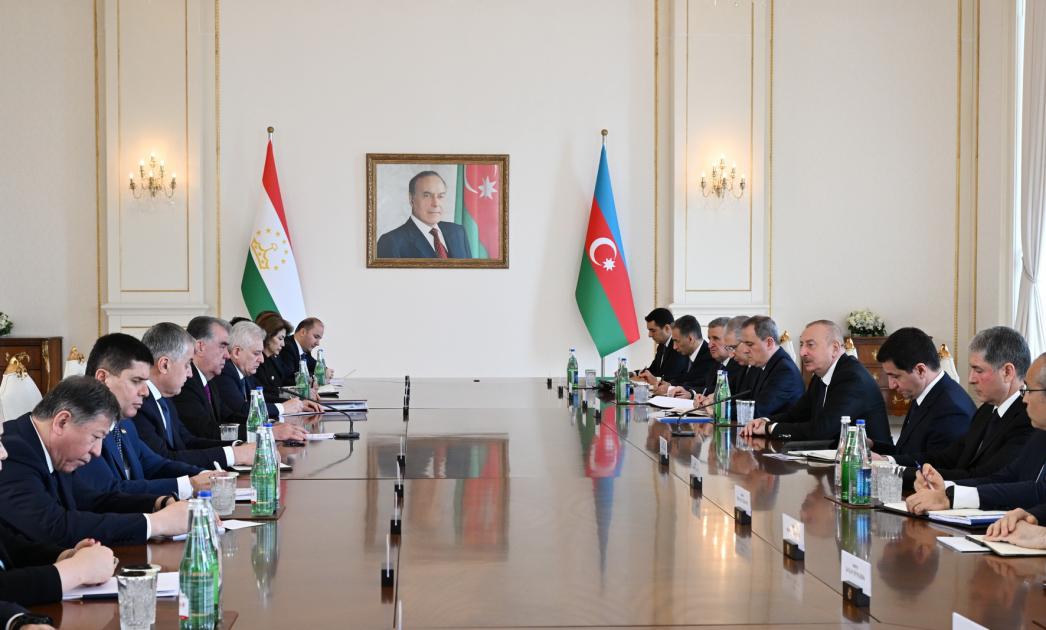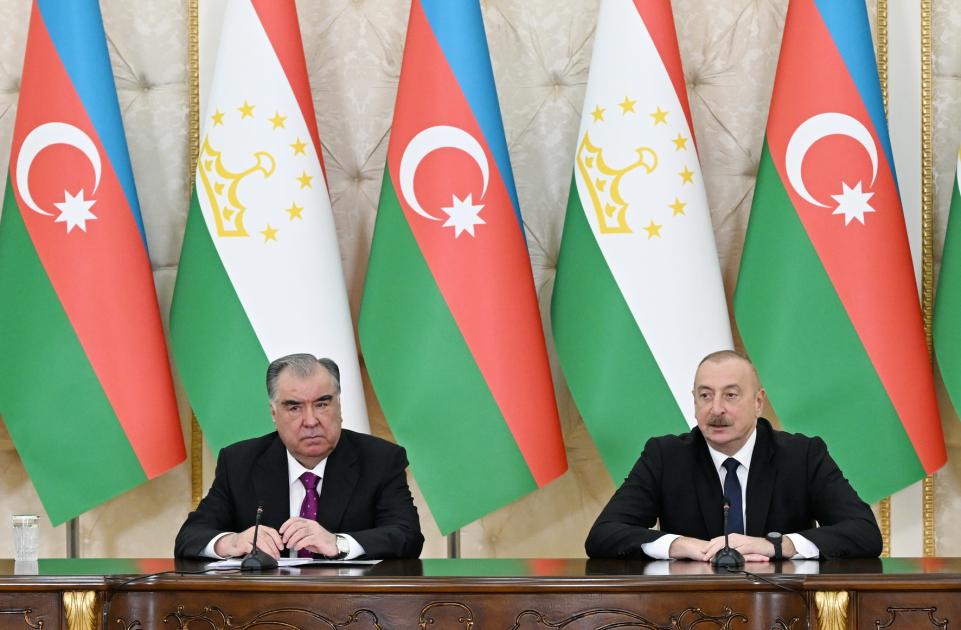Azerbaijan, Tajikistan elevate bilateral relations through strategic partnership agreements
For over two decades, Central Asian states and Azerbaijan have consistently formed a strategic alliance based on joint trade, energy and transportation endeavors. This partnership has further expanded in recent years against the backdrop of global geopolitical changes and the desire of the regional countries to increase cooperation through the implementation of joint business projects. Tajik President Emomali Rahmon’s state visit to Azerbaijan was another step in this regard, during which the prospects for expanding Azerbaijani-Tajik trade and economic relations were discussed and a number of important bilateral documents were signed.
Central Asia and Azerbaijan historically form a single civilization, and this region is of strategic importance in the world geopolitics and economy today. One of the main vectors of Azerbaijan's foreign policy and economic strategy in the recent period has been the strengthening of business cooperation with Central Asian countries. Moreover, this strategic direction was strengthened by integration initiatives in the spheres of transport and energy, as well as joint industrial, agricultural and trade projects implemented within the Organization of Turkic States (OTS) together with Türkiye.
Taking into account the geopolitical negativity of recent years, the need for transshipment of cargoes - hydrocarbons, fuel, grain, metal concentrates, fertilizers, equipment, machinery - through the alternative Middle Corridor has increased manifold. All Central Asian countries, including Tajikistan, are very interested in the development of this route, striving to improve logistical ties with Azerbaijan and intending to integrate its rail and road routes into the transportation network of the Middle Corridor.
Despite the fact that Tajikistan has no common borders with Azerbaijan along the Caspian Sea and is geographically quite distant, trade and economic relations between the two friendly states have overcome inertia in recent years and are consistently developing. A few days before Tajik President Emomali Rahmon’s state visit to Azerbaijan, a business forum was held in Baku, followed by the Days of Culture of Tajikistan.
"Azerbaijani-Tajik high-level contacts are regular in nature, and today we have continued our consultations and discussions on many important issues. One of the important stages in the development of relations is the Declaration on Strategic Partnership, which we will sign today," Azerbaijani President Ilham Aliyev said during the meeting.
“And, of course, one of the topics we discussed today is cooperation in the transport sector, taking into account the new opportunities of the transport and logistical infrastructure of Tajikistan and Azerbaijan. It will be useful to join our efforts in this direction and coordinate our steps more closely, because the Trans-Caspian transport corridor is becoming increasingly popular in the European and Central Asian regions.”

Noting that several documents of economic nature were signed during the meeting, the head of state emphasized that special attention would be paid to increasing trade turnover within the discussions with members of the two delegations. Compared to other countries of the Central Asian region, the Azerbaijani-Tajik trade has not yet reached the level corresponding to the economic potential of the two countries. Thus, according to the State Customs Committee of Azerbaijan, the trade turnover between the two countries in 2023 amounted to $6.127 million, exceeding the previous year's figures by almost three per cent. Nevertheless, in the first quarter of this year, the trade dynamics has noticeably increased: the turnover exceeded $1.4 million, which is almost 40 per cent more than the indicators of the corresponding period of last year.
In order to consistently expand trade and investment cooperation, Baku and Dushanbe have in recent years initiated a number of joint projects covering the energy sector, as well as the oil and aluminum industries, and new contacts are being established in light industry, transport, telecommunications, agriculture, and the financial sector. Business interaction is also expanding within the regional platform - the UN Special Program for the Economies of Central Asia (SPECA): for example, last November, during the SPECA week in Baku, the two countries agreed to boost cooperation in the transport and energy sectors.

To date, the legal base of bilateral cooperation is based on about 80 agreements regulating various spheres of interaction. In particular, on May 20 this year, during the Azerbaijani-Tajik business forum in Baku, the countries signed about half a dozen new agreements, mostly aimed at expanding industrial cooperation between Baku and Dushanbe.
"Today, we also discussed in detail the issues of economic interaction. Along with the Declaration on Strategic Partnership, we have signed 13 other documents, some of which were signed here and others earlier. This significantly strengthens the legal framework of our relations," President Ilham Aliyev said at a joint press statement with the President of Tajikistan.

In particular, as part of the visit of the President of Tajikistan, agreements were reached on a number of important areas on the business track. The Memorandum of Understanding between the Ministry of Digital Development and Transport of Azerbaijan and the Ministry of Industry and New Technologies of Tajikistan, as well as intergovernmental agreements on cooperation in the field of industrial property protection, cooperation in the field of digital trade, and cooperation in the field of technical protection of information should be emphasized here. It is noteworthy that the joint Baku-Dushanbe business forum held earlier this week in Baku also proved to be very productive in terms of expanding the portfolio of joint business endeavors.
"Azerbaijan and Tajikistan have the potential to realize joint projects in the light, chemical and mining sectors. Industrial clusters, including the Alat Free Economic Zone in Azerbaijan, are another great opportunity to expand joint endeavors," Azerbaijani Economy Minister Mikayil Jabbarov said recently. In particular, the most important outcome of the business forum was the conclusion of a Memorandum of Understanding between Tajik aluminum plant TALCO OJSC and Azeraluminium OJSC. Under the agreement, Azerbaijan will assist in attracting finance for the reconstruction of TALCO. It is also planned to establish export of Azerbaijani alumina to Tajikistan, and to supply aluminum, cryolite and aluminum fluoride in the reverse direction.
In turn, a number of Azerbaijani and Tajik companies and specialized government agencies signed an agreement on cooperation in cotton growing, processing of raw cotton, organization of textile production, as well as processing of cotton seeds and export of cotton oil. Baku and Dushanbe will cooperate in the field of digitalization of agriculture and introduction of advanced agricultural technologies. It is planned to exchange experience and know-how in ferrous and non-ferrous metallurgy, as well as in mining and banking spheres. It is also planned to develop bilateral ties in the recreational sector.
A regular flight between Baku and Dushanbe has been launched since last May. An additional flight between the capitals is expected to be introduced this year, and this contributes to the expansion of tourism and cultural and humanitarian ties. "Azerbaijan is a reliable friend and partner for Tajikistan.Today, we made a historic decision that will raise our interstate relations to the level of strategic partnership," Tajik President Emomali Rahmon summarized the results of the meeting.
He also emphasized that the total amount of commercial contracts and agreements signed on the margins of the forum exceeded $700 million. Agreements were also reached to develop new approaches to expand the range of goods exported by the two countries, which contributes to the expansion of bilateral trade turnover.








